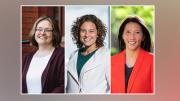Three Harvardians have been named MacArthur fellows. Known as the “genius” grant, the fellowship recognizes individuals across disciplines who have “shown extraordinary originality and dedication in their creative pursuits and a marked capacity for self-direction.” Each of the approximately two-dozen fellowsis awarded $800,000, paid over five years. The funds are a no-strings-attached investment in the promise of the fellows’ work.
The Harvard-affiliated recipients are:
Melanie Wood, Harvard professor of mathematics and Radcliffe Alumnae professor at the Radcliffe Institute for Advanced Study. A mathematician, Wood seeks answers to foundational questions in pure mathematics. Her work has revealed new properties of natural numbers that are relevant to other mathematical theories—setting the stage for new discoveries in number theory. While much of mathematics research focuses on developing proofs for conjectures, it’s often impossible to check that a hypothesis is true in all cases. But Wood uses arithmetic statistics to verify these hypotheses, developing probabilistic models for number theoretic objects (such as prime numbers) to see how they behave on average. She and her team have led several major mathematical advances, such as determining—contrary to longstanding beliefs— that there are a finite number of elliptic curves with rank (a measurement of how many of the solutions to that curve’s equation are rational numbers) greater than 21. She also introduced new techniques to determine the behavior of sandpile groups (models of dynamical systems that self-organize around a critical point) of random graphs. Her research on the Cohen-Lenstra heuristics (a set of conjectures about the distribution of class groups of quadratic number fields) has advanced understanding of the structure of these groups and for more general families of situations. All her work explores foundational mathematical questions and sets the stage for future discoveries in the field.
Danna Freedman ’03, Keyes professor of chemistry at MIT. Freedman is a synthetic inorganic chemist bringing the world closer to a quantum future. Using the tools of synthetic chemistry, she designs molecules that act as qubits—the buildings blocks of quantum systems—in more accessible conditions than those previously required. Quantum properties allow us to transcend the limits of classical computing. Where traditional computers use binary bits that exist in one of two distinct states (0 or 1), qubits can exist in multiple states at a time, and have much greater storage and processing capacity than bits. Typically, qubits made from superconductors or ions require specific conditions to exhibit quantum behavior and are generally unstable and challenging to harness. Freedman fixed this problem by using molecular chemistry to create viable molecular qubits from the electron spin of paramagnetic coordination complexes—molecules with a central metallic atom with unpaired electrons, surrounded by bonded molecules or ions. She also synthesized a qubit that can operate at room temperature. Her molecular qubits are promising for technologies like quantum sensors capable of measuring minute variations in magnetic or electrical fields. Freedman also synthesized the first iron-bismuth binary compound with permanent magnetic properties—important components in wind turbines and other renewable energy mechanisms.
Emily Wang ’97, professor of medicine and public health at the Yale School of Medicine. Wang is a primary care physician and researcher addressing the influence of incarceration on chronic health conditions. She partners closely with justice-involved populations to develop effective clinical services and a better understanding of healthcare-access barriers that they face. During her medical residency at the University of California, San Francisco, Wang co-founded the Transitions Clinic to provide primary care and other support services to people reentering the community after prison. One of the program’s core components is recruiting, training, and employing people with lived experience of incarceration to work alongside medical staff as community health workers. Wang now directs research for the initiative, which has expanded into the Transitions Clinic Network (TCN), a group of 48 clinics in 14 states and Puerto Rico. In 2020, she became the inaugural director of the SEICHE Center for Health and Justice, a collaboration between Yale School of Medicine and Yale Law School, which identifies legal, policy, and practice levers that can improve the health of individuals and communities impacted by incarceration. In all her work, Wang shines a light on the complex health needs that are often overlooked in the penal system.









